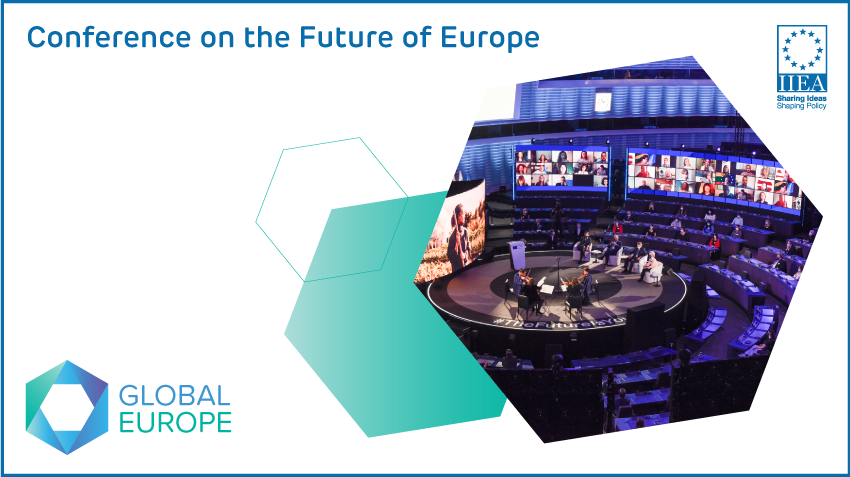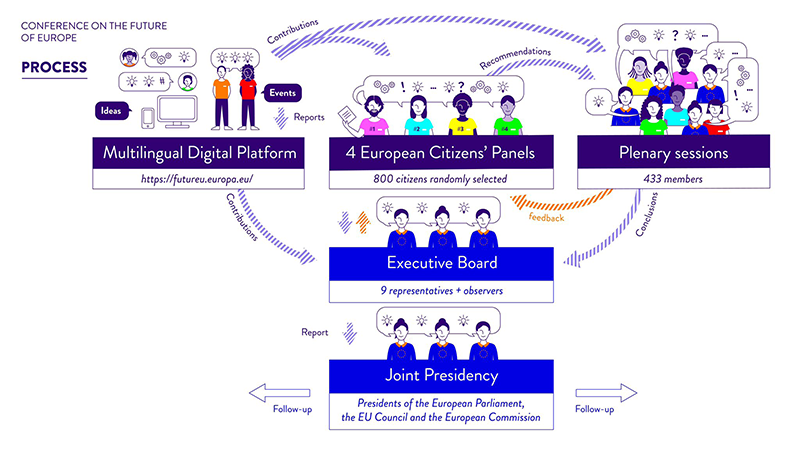Conference on the Future of Europe

Authors: Emily Binchy and Alexander Conway
The Conference on the Future of Europe (COFE), which was formally launched by the Presidents of the EU institutions on Sunday, 9 May 2021 to coincide with Europe Day is now underway. The Conference commenced under the auspices of the Portuguese Presidency, will continue under the Slovenian Presidency and will conclude in March 2022 during the French Presidency. This explainer seeks to demystify the complex processes involved in the structure of the Conference.
The objective of COFE is to give EU citizens from across the EU a say in the future shape, direction and purpose of the EU. A key goal of the Conference is to engage EU citizens in debates on the future and to ensure that the EU is more responsive and better able to address the concerns and desires of its citizens. The Conference aspires to achieve this by collecting their views in a broad and open-ended process, the exact nature of which is still to be defined. Given this strong future-oriented focus, a central role will be allocated to youth participation. The outcome of this Conference has the potential to be far-reaching, possibly even resulting in Treaty change. COFE aims to bring Europe beyond its capital cities and to strengthen the link between European citizens in all corners of Europe and the EU institutions.
The main focus of the Conference will be on strategic policy issues and goals for the future, with a secondary focus on institutional matters and reform. Whilst the European Parliament, the Council and the European Commission have committed to listen to the views of citizens gleaned during the conference, it is not yet clear to what extent these views will ultimately shape the Union’s long-term strategy.
Conference Structure and Processes
The Conference will be overseen by the three Co-Chairs of the nine person Executive Board who represent the three institutions: Guy Verhofstadt (European Parliament), Ana Paula Zacarias (Council of the EU) and Dubravka Šuica (European Commission). The other members of the Executive Board are: two European Commissioners, two MEPs from the biggest groupings in the European Parliament, and two representatives from the forthcoming holders of the presidencies of the Council of the EU: Slovenia and France.

Source: Twitter @RNihoul
The Conference itself is structured as follows:
The Multilingual Digital Platform - the hub of the Conference, is an online forum where all citizens can share their thoughts, and find, organise and participate in events. Citizens can choose to comment online on a range of topics (which include: climate change and the environment; health; a stronger economy, social justice and jobs; EU in the world; migration; European democracy; digital transformation; values, rights, rule of law and security; education, culture, youth and sport).
Ideas will be collected, analysed, monitored and published on the online platform by the Commission, and these will feed into the discussions in the Citizens’ Panels, Plenaries and Executive Board’s Report. This platform will also include a feedback mechanism. According to Commissioner Šuica, this platform could become a permanent consultation tool.
Four European Citizens’ Panels, which will comprise in total a representative group of 800 randomly selected citizens in terms of geographic origin, gender, age and socioeconomic backgrounds. Each panel will comprise 200 citizens, with people aged 16 – 25 making up a third of each panel. Each of the four panels will focus on a selected theme, grouped under the following headings:
- Values, rights, rule of law, democracy, security
- Climate change, environment/health
- Stronger economy, social justice, jobs/education, youth, culture, sport/digital transformation
- EU in the world/migration.
- These discussions will be complemented by feedback from the Plenaries and the Executive Board and contributions from the Multilingual Digital Platform.
Conference Plenaries, at which representatives from the European Parliament, the Council and the European Commission will debate recommendations without a predetermined outcome. The inaugural Conference Plenary took place on Saturday, 19 June 2021, in Strasbourg, with a hybrid format of remote and physical participation.
The Conference Plenaries will have 433 participants (108 representatives from the European Parliament, 54 from the Council, 3 from the European Commission, 108 from all national Parliaments and 108 randomly chosen citizens (80 from European Citizens’ Panels, 27 representing national Citizens’ Panels, i.e., 1 per Member State, and the President of the European Youth Forum), 18 from the Committee of the Regions and 18 from the Economic and Social Committee, 8 from social partners and 8 from civil society). High Representative Borrell will also be invited when the international role of the EU is to be discussed.
These Plenaries will submit the conclusions of their sessions to the Executive Board and provide feedback to the European Citizens’ Panels. The Executive Board, assisted by the Common Secretariat, will then draft a report on the conclusions of the Plenaries, as well as the contributions of the Digital Platform and Citizens’ Panels. This report will be then presented to the so-called Joint Presidency composed of the Presidents of the European Parliament, David Sassoli, the EU Council, currently Portuguese Prime Minister, António Costa, and the European Commission, Ursula von der Leyen.
The three institutions will explore how to follow up effectively on the recommendations of the report, within their relevant spheres of competence and in accordance with the European Treaties. In addition, spontaneous, decentralised events, organised by citizens as well as by national, regional and local authorities across Europe will be held online and in person.
Challenges and Limitations Facing the Conference on the Future of Europe
Discussions at the in-person assemblies and on the online platform will be broadly based on the priorities of the European Council’s Strategic Agenda and the European Commission’s political guidelines. They will also take place against the backdrop of challenges posed by COVID-19 to the fragile social contract between the EU and its citizens. These discussions will reflect on issues of EU competency and will explore whether and where transfer of further national competencies might be desirable. Several Member States are hesitant, if not explicitly opposed to treaty change, while others, like Germany, are open to possible treaty reform. The European Commission has also indicated its openness to this outcome. Speaking to the IIEA on Monday 17 May 2021, Taoiseach Micheál Martin stated that Ireland would not rule out treaty change, although its preference would be to first explore the possibilities for reform within the scope of the current treaties. Furthermore, President of the European Parliament, David Sassoli, during a webinar address at the College of Europe on Tuesday, 15 June 2021, contended that in order for COFE to reach lasting conclusions, it should have the freedom to explore these matters: “Updating the Treaties must not be a taboo,” he said.
While the idea for a Conference which would discuss the Future of Europe was initially proposed by French President Emmanuel Macron in 2019, as part of a broader French vision for Europe, the timeline for the Conference was shortened by COVID-19 from two years to one year. This means that the final stages of the Conference will be coterminous with the French Presidency of the Council of the EU which starts in January 2022 and during which the Conference will conclude in March 2022, just before the French presidential elections in April 2022. France, therefore, is likely to have a considerable role in steering the ultimate direction and outcomes of the Conference.
Whether the Conference will make a lasting contribution to EU reform remains to be seen. A lack of clarity regarding the framework for the Conference outcome, combined with the reluctance of some Member States to contemplate radical proposals which involve treaty change or structural reform, have the potential to limit the ambition of the Conference. The EU’s commitment to engage with its citizens on key issues that may define the future of the Union is a positive initiative, coming at a time of serious economic and social challenges for the Union, and in theory could provide the foundations for a renewed and citizen-led reform impetus in the EU.
